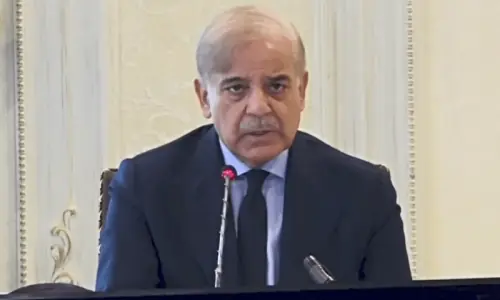Pakistan and Afghanistan reached certain agreements during trade talks in Kabul, including beginning negotiations on a revised transit trade agreement and implementing a temporary admission document (TAD) for trade vehicle drivers, officials said on Friday.
Talks were held amid tensions following Pakistan’s March 18 airstrikes in Afghanistan’s Patika and Khost provinces in “intelligence-based anti-terrorist operations”, which Afghan authorities said killed eight people.
The Foreign Office had confirmed the strikes, saying they were aimed at the Hafiz Gul Bahadur group, which was responsible for multiple terrorist attacks inside Pakistan, including one on security forces in North Waziristan that martyred seven soldiers.
On Thursday, Foreign Office (FO) spokesperson Mumtaz Zahra Baloch said in a weekly press briefing that Commerce Secretary Mohammad Khurrum Agha visited Afghanistan from March 24-27 to discuss bilateral trade and transit with his Afghan counterpart Nooruddin Azizi.
The two sides discussed a bilateral Preferential Trade Agreement, implementing a TAD for trade vehicle drivers, multimodal air transit and issues related to transit trade.
“We are encouraged by the progress made on these issues and remain committed to promoting trade and people-to-people ties with Afghanistan,” the FO had said.
Pakistan embassy officials in Kabul said today that progress was achieved on multiple issues — including a bilateral preferential trade agreement, air transit, the operation of border crossings 24/7 for trade purposes, addressing the issues in transit trade through Afghanistan and Afghan Transit Trade that passes through Pakistan.
Afghan charge d’affaires Sardar Shakib Ahmad rushed to Kabul to brief officials about his meetings in Islamabad. He met acting Afghan Foreign Minister Amir Khan Muttaqi and briefed him regarding recent developments in the relations between Afghanistan and Pakistan, deputy foreign ministry spokesman Hafiz Zia Ahmad Takkal said.
Pakistan’s head of mission in Kabul Ubaidur Rehman Nizamani said the visit of the commerce ministry delegation was part of Pakistan’s efforts to build strong ties with Afghanistan in transit, trade and all other mutually beneficial areas.
“I am happy to report that this was a successful visit and both sides have agreed to work together for mutual benefit in a number of areas,” Nizamani said in a video statement.
He said Pakistan and Afghanistan will facilitate transit and bilateral trade and take all possible measures to create an environment conducive to continuous and productive trade and economic relations between the two countries.
Secretary Commerce Mohammad Khurram Agha led the Pakistani delegation in the two-day talks with Acting Minister of Industry and Commerce Azizi.
Afghan government spokesman Zabihullah Mujahid said both sides agreed to discuss the Afghan-Pakistan Transit Trade Agreement (APTTA) and decided that a revised agreement should be finalised within two months.
The revised 2010 APTTA expired before the Taliban took control of Kabul in August 2021. Both sides had failed to agree on a new draft during the tenure of former President Ashraf Ghani.
Mujahid said it was also agreed that Pakistan would facilitate the transfer of goods from international containers to regional containers (cross-stuffing) in the ports of Karachi in the next six months.
An agreement was also reached regarding preferential trade, where both sides will give tariff preferences to 10 items of export goods, eight of which are agricultural and two industrial.
Furthermore, an agreement was reached on providing temporary free licenses for truck traffic over a one-year trial period, which will be implemented from May 2024 onwards.
Both sides also reached a consensus on the transfer of goods through both countries’ airports in the form of multi-modal air transit, which will start in the next two months.
As part of Pakistan’s recent measures regarding Afghanistan’s transit goods, it was agreed that within a week, the mandatory bank guarantee should be removed and insurance should be used as before. Necessary measures will be taken to remove other obstacles in consultation with the parties.
Both sides also agreed to abandon barter and establish and develop banking relationships. The export of coal from Afghanistan to Pakistan was discussed and the Pakistani side expressed its readiness to buy it at the international price.
Abdul Salam Jawad, spokesman for the Afghan commerce ministry, said: “We will take up the issue of a ban on several transit items. Pakistan has banned the import of certain items under the transit agreement.”
Pak-Afghan traders welcome agreements

Pakistani and Afghan business leaders welcomed the agreements and said it would help normalise transit and trade relations.
Khan Jan Alokozai, co-chairman of the Pakistan-Afghanistan Joint Chamber of Commerce and Industry (PAJCCI), noted that both countries reached certain useful agreements after a long time.
“There was a determination by both sides to bring transit and bilateral relations to normal. A review of the APTTA is an achievement. All problems have not been resolved but the agreements have paved the way for solutions to problems,” Alkozai told Dawn.com.
Highlighting that agreements were signed but sometimes were not implemented. “We will see if they are implemented, but I can say we are moving in the right direction.”
Ziaul Haq Sarhadi, coordinator of PAJCCI for Khyber Pakhtunkhwa, was confident that the agreements would bring back nearly 70 per cent of transit trade to Pakistani ports, which had been shifted from Karachi ports to Iranian ports.
“Ending the condition of 100pc bank guarantee for Afghan importers, reviewing the negative list and imposing a 10pc duty on Afghan imports are key decisions to end hurdles in trade relations,” Peshawar-based Sarhadi told Dawn.com.
He also welcomed an end to the conditions of visas and passports for Afghan drivers and cleaners.

































